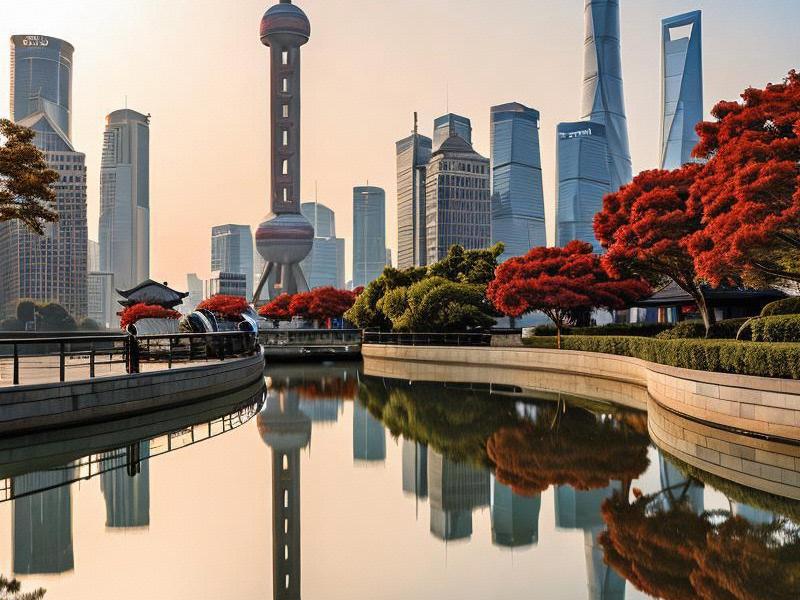Shanghai, often referred to as the "Pearl of the Orient," stands as a beacon of modernity and progress in China. This vibrant metropolis, located on the eastern coast of China, is not only the largest city in the country but also a significant global financial hub. With its rich history, dynamic economy, diverse culture, and commitment to innovation, Shanghai continues to captivate the world with its unique blend of tradition and modernity.

Shanghai's history dates back thousands of years, but it was during the 19th century that the city began to transform into the cosmopolitan center it is today. Forced open to foreign trade by the Treaty of Nanking in 1842 following the First Opium War, Shanghai quickly became a melting pot of cultures and a hub for international commerce. The establishment of the International Settlement and the French Concession brought a wave of Western influence, leaving a lasting architectural legacy that can still be seen today in areas like the Bund and the French Concession.
The economic rise of Shanghai has been nothing short of remarkable. In the late 20th century, the Chinese government designated Shanghai as one of four municipalities directly under the central government, granting it a unique status that has propelled its rapid development. Today, Shanghai is home to the world's busiest container port, the largest stock exchange in mainland China, and a thriving financial district that rivals those of New York and London.
The city's skyline is a testament to its economic prowess, with iconic skyscrapers like the Oriental Pearl Tower, the Jin Mao Tower, and the Shanghai Tower. These modern marvels stand alongside historical landmarks, creating a cityscape that seamlessly blends the old with the new. The Bund, a waterfront area along the Huangpu River, offers stunning views of this juxtaposition, with its historic buildings facing the futuristic skyline across the river.
Culturally, Shanghai is a vibrant tapestry of traditions and modern influences. The city is renowned for its art scene, with galleries and museums showcasing everything from traditional Chinese art to cutting-edge contemporary works. The Shanghai Museum, for example, is a treasure trove of Chinese art and history, attracting millions of visitors each year.
上海龙凤419足疗按摩
Shanghai's culinary scene is another highlight, offering a unique blend of flavors that reflect the city's diverse population. From traditional Shanghainese dishes like xiaolongbao (soup dumplings) and shengjianbao (pan-fried buns) to international cuisines, the city's food culture is as dynamic as its people. The French Concession, in particular, is a haven for food lovers, with its charming streets lined with cafes, bakeries, and restaurants.
Innovation is at the heart of Shanghai's identity, and the city has become a global leader in technology and entrepreneurship. The Zhangjiang Hi-Tech Park, often referred to as "China's Silicon Valley," is home to numerous high-tech companies and research institutions. Shanghai's commitment to innovation is also evident in its smart city initiatives, which aim to integrate technology into every aspect of urban life, from transportation to energy management.
The city's education system is another area where Shanghai excels. Renowned universities like Fudan University and Tongji University attract students from around the world, contributing to the city's intellectual vibrancy. Shanghai's emphasis on education and research has positioned it as a key player in China's drive to become a global leader in science and technology.
上海龙凤419自荐
Sustainability is a growing focus for Shanghai, as the city grapples with the challenges of urbanization and environmental protection. Initiatives like the construction of green spaces, the promotion of public transportation, and the development of renewable energy sources are helping to crteeaa more sustainable urban environment. The city's commitment to sustainability is not only about preserving its natural resources but also about ensuring a high quality of life for its residents.
Shanghai's role in global affairs is also noteworthy. As a member of the World Expo, the city has hosted major international events that bring together people from around the world to share ideas and foster cooperation. The 2010 World Expo, for example, was a showcase of Shanghai's ability to host large-scale events and its commitment to sustainable development.
The city's cultural exchanges with the rest of the world are extensive, with numerous international organizations, embassies, and consulates based in Shanghai. These institutions play a crucial role in fostering diplomatic relations and promoting cultural understanding. Shanghai's international airport, one of the busiest in the world, serves as a gateway for millions of travelers each year, further cementing the city's status as a global hub.
上海贵族宝贝龙凤楼
Despite its rapid development, Shanghai remains deeply rooted in its traditions and history. The city's ancient temples, like the Longhua Temple, stand as a reminder of its rich cultural heritage. Traditional festivals, such as the Mid-Autumn Festival and the Spring Festival, continue to be celebrated with great enthusiasm, showcasing the enduring spirit of the Shanghainese people.
Shanghai's future looks bright, with ambitious plans for further development and innovation. The city is investing heavily in infrastructure projects, including the expansion of its metro system, the construction of new airports, and the development of smart city technologies. These initiatives aim to enhance the quality of life for residents and attract more businesses and talent to the city.
In conclusion, Shanghai is a city that embodies the spirit of China's transformation into a global power. Its economic success, cultural vibrancy, commitment to innovation, and focus on sustainability make it a model for urban development around the world. As Shanghai continues to grow and evolve, it remains a symbol of the possibilities that lie ahead for China and the global community.